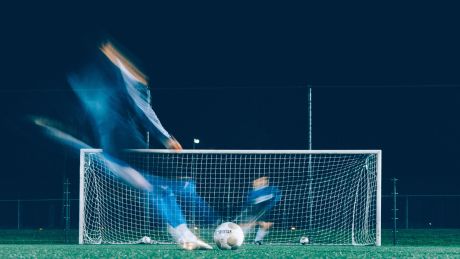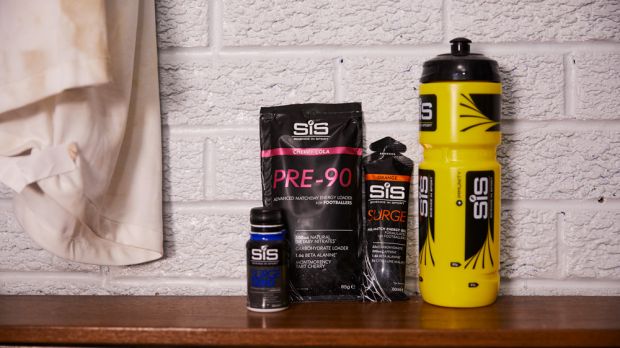The Sports Nutrition Mistakes Amateur Footballers Make
And what you can learn from Manchester United’s elite players to improve your performance

If you watch any top-level football, you may have noticed players sucking down what looks like Frubes before starting a game or coming on as a sub. Anyone who regularly takes part in endurance events will recognise these as energy gels rather than flavoured yogurts, and perhaps wonder why something that’s been so common in running and cycling is only now coming to prominence in football.
It seems someone at sports nutrition company Science In Sport had the same thought (jinx!) as the brand recently released a range which includes gels for amateur footballers. SiS has form in the game though: it’s been supplying supplements to Manchester United since 2008 and is the official nutrition partner of the club, along with 15 other teams in England and Scotland.
As part of the launch, we got the chance to sit down with Mark Ellison, consultant nutritionist at United, and quizzed him on how elite players fuel their performance and what amateur players can do to nail their nutrition.
What mistakes do you see players of any level make when it comes to nutrition?
Athletes often think you can out-train your diet. The big thing that you see with young athletes in particular is a lack of good fruit and vegetable intake. We always encourage them to increase that to get decent amount of vitamins and antioxidants in their diet to maintain health.
The second one is that a lack of forward planning catches people out. We always make sure that our players have a plan in place. It might not always be a detailed plan measured out gram by gram, but it’s clear when to focus on energy intake to make sure there’s the fuel to play, and when to focus on protein intake to drive muscle recovery.
I think one of the big gaps I often see is the pre-training meal and, because in football we typically train early, protein intake at breakfast, especially when we’re going to train hard and do muscle damage. A couple of slices of toast and a glass of orange juice or coffee is not sufficient for breakfast on a training day. So often, those players that don’t want eggs and things like that will use SiS’s Rego, or we’ll put some of the SiS whey protein into porridge or add it to smoothies at breakfast, just to top up the protein.
And generally, people drink when they’re thirsty, but don’t proactively drink when they’ve got a session coming up. So often it’s reminding players to drink water and make sure they’re hydrated going into training sessions.
Sign up for workout ideas, training advice, reviews of the latest gear and more.
What are the basics every player of every level should get right?
As well as dealing with those mistakes, having regular protein feeds throughout the day. We target four protein feeds throughout the day of around 40g each – and there’s a good argument for much of the population having a solid protein intake, especially as people get older, to protect muscle mass and make sure they stay strong.
The other big one is sufficient carbohydrate intake to make sure you’ve got enough energy for the work you’ll be doing. Especially for recreational players who have kids or really busy work lives, it’s easy to miss meals then go to training in the evening without enough energy, so using things like gels for a top-up before you go to train is perfect. We always say try and get a meal three or four hours before you train, then you can top up on your way to training with a gel or sports drink. We use the Go gels, or Go Hydro and Go Electrolyte products with a bit of carbs.
We focus on slow-release carbs away from training, whether it’s porridge oats or granary bread, and fast release as we get closer to training for quick energy.
See related
- Nail Pre-Season Training With These Football Fitness Drills
- Try This Pre-Season Football Workout From Theo Walcott And John Terry’s PT
- Score More Goals With These Football Tips From England’s Striking Coach
Do Manchester United players get extra advice because of the level they’re at?
There are more cutting-edge, individualised bits of advice we give. Beta-alanine supplementation is a novel strategy that you wouldn’t see applied in the general public’s diet. We get that in the Surge product and often supplement some of the players with that, especially those high-intensity midfield, box-to-box players that are generating lactic acid. That can be a source of fatigue and underperformance if the acid component of lactic acid isn’t cleared.
Beta-alanine as a supplement combines with another amino acid in the diet called histidine to make carnosine in the muscle cell, which works as a buffer to soak up that acid component and delay fatigue.
We also focus on hydration and electrolyte intake, more so than non-active people. We make sure they get electrolytes in their diet to drive hydration.
Another difference is timing. Everybody has protein in the diet, for example, but these guys are taking it in more of a targeted, timed way to enhance recovery.

As well as beta-alanine, the new SiS range features nitrates and caffeine. Why?
The research looking at nitrates has been around two things. First, for endurance athletes, some studies found a reduction in oxygen costs with cyclists, so it was allowing them to work for longer before they fatigued. Possibly from some vasodilatory effects, which increases blood flow and helps you get the oxygen to the muscles.
There’s an endurance element to football, but it’s probably not always a limiting factor for us. Football is more about high power output – being able to sprint, then sprint again. There's some suggestions that nitrates might be affecting how the muscle contracts. We’re still learning about the exact mechanism, but it can be a real benefit.
For caffeine, there’s that endurance element when taking caffeine in larger doses, like 3mg per kilo of bodyweight, as it’s going to help reduce carbohydrate dependence early in the game so we've got more energy towards the end.
And everyone who drinks coffee will experience those benefits of feeling more alert. There’s research on visual acuity suggesting you can see things sharper and react quicker. When you want to start a game fast, get a lift at halftime, or you've had a knock and you need a pick-up during the game, products like the Surge gels are great for giving a decent 200mg caffeine dose. The guys feel alert and ready to compete.
Visit sisfootball.com for more nutrition advice and to buy the new football range

Jonathan Shannon was the editor of the Coach website from 2016 to 2024, developing a wide-ranging experience of health and fitness. Jonathan took up running while editing Coach and used the training plans on the site to run a sub-40min 10K, 1hr 28min half marathon and 3hr 6min marathon. He’s an advocate of cycling to work and is Coach’s e-bike reviewer, and not just because he lives up a bit of a hill. He also reviews fitness trackers and other workout gear.
